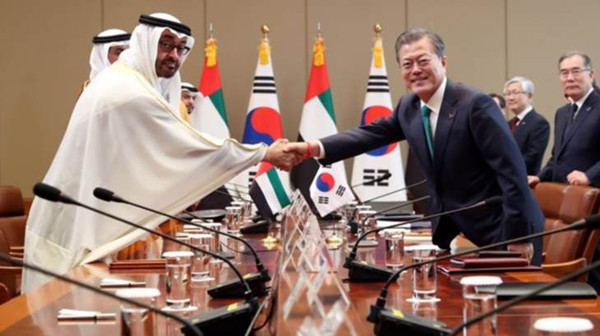South Korea and UAE seek cooperation beyond Barakah
The leaders of South Korea and the United Arab Emirates have said the two countries will seek opportunities to cooperate in the field of nuclear energy beyond their current collaboration on the Barakah nuclear power plant project. This will include opportunities in third countries.

Al Nahyan and Moon at their meeting in Seoul (Image: Cheong Wa Dae)
Crown Prince of Abu Dhabi and Deputy Supreme Commander of the UAE Armed Forces Sheikh Mohamed bin Zayed Al Nahyan met with South Korean President Moon Jae-in in Seoul during an official visit to South Korea on 26-27 February.
During their meeting, the two leaders held in-depth discussions on regional and international issues of common interest and priority, and reaffirmed the importance of continuing to ensure close cooperation between the two countries. They agreed to strengthen bilateral cooperation in high-tech industries to develop a so-called special strategic partnership.
They agreed the high-level consultation on nuclear cooperation helps "continue to play a pivotal role in further enhancing trust and friendship between the two nations".
In a joint statement issued today, Moon and Al Nahyan said: "Recognising the Barakah nuclear power plant project as a valuable foundation for the further deepening of bilateral cooperation, the leaders agreed that the two countries would continue to work closely in finalising the project."
In December 2009, the UAE's Emirates Nuclear Energy Corporation (Enec) placed a USD20 billion order with a consortium of South Korean companies for the construction of four APR1400 reactors at Barakah, in the Dhafrah region of Abu Dhabi. The contract marked South Korea's first overseas nuclear order. Moon and Al Nahyan attended a ceremony last March to celebrate the completion of construction at Barakah unit 1. All four units are scheduled for completion by next year.
The joint statement added, "The two leaders recognised the importance of expanding the strategic nuclear partnership and seeking opportunities for potential cooperation in third countries."
Moon said South Korea and the UAE need to work together in the nuclear energy sector for at least 100 years, KBS World Radio reported. According to Presidential Spokesman Kim Eui-kyeom, Moon said nuclear power plant projects require cooperation throughout all stages, starting from brainstorming to designing, construction, operations and maintenance.
In April 2018, Enec and its joint venture subsidiaries, Nawah Energy Company and Barakah One Company (BOC), signed three agreements with Korean companies. Enec and Kepco Nuclear Fuel signed a memorandum of understanding to cooperate in the field of nuclear fuel and in overseas business development; Nawah and Kepco Engineering and Construction signed an engineering support contract for the Barakah plant to 2030; and Korea Electric Power Company (Kepco) agreed a charter for joint business cooperation with BOC to enhance cooperation throughout the nuclear business cycle, from planning and construction to operation.
Enec and Kepco in October 2016 signed a joint venture agreement that made Kepco a minority shareholder in Nawah and BOC.
Kepco subsidiary Korea Hydro & Nuclear Power and Nawah in June 2017 agreed to cooperate in the sharing of experience in the operation of Korean-designed APR1400 reactors. South Korea's first APR1400 unit entered commercial operation in December 2015.
- China Institute of Atomic Energy
- Nuclear Power Institute of China
- Southwestern Institute of Physics
- China Nuclear Power Operation Technology Corporation, Ltd.
- China Nuclear Power Engineering Co., Ltd.
- China Institute for Radiation Protection
- Beijing Research Institute of Uranium Geology (BRIUG)
- China Institute of Nuclear Industry Strategy (CINIS)
- China Nuclear Mining Science and Technology Corporation


